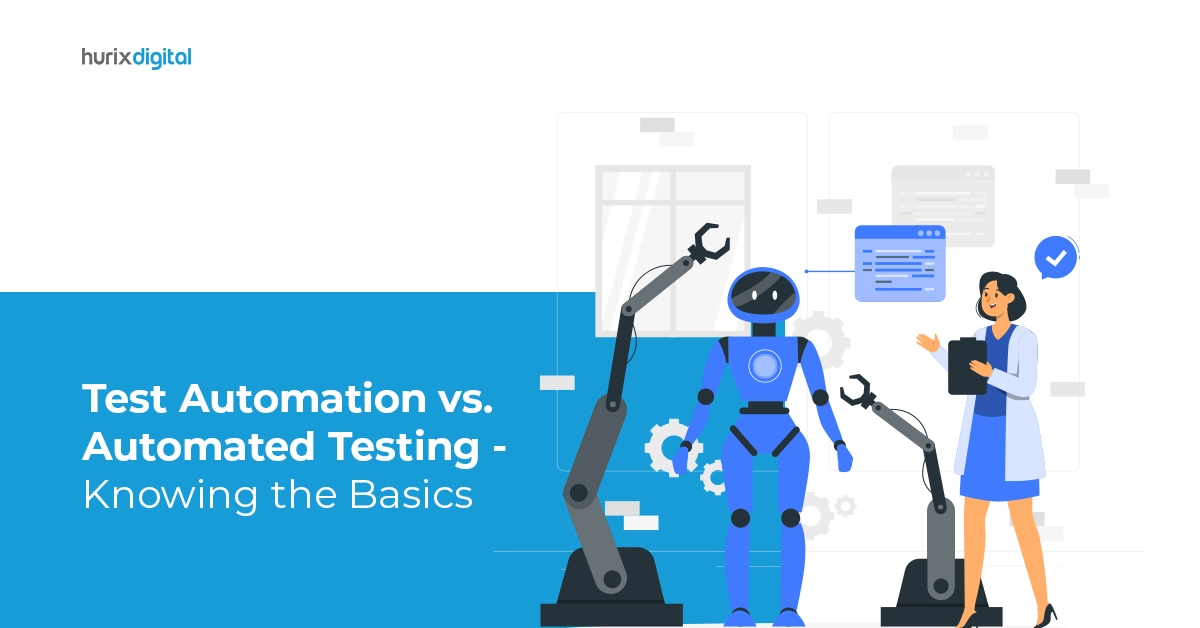Summary
This blog provides a brief overview of the concepts of automated testing and test automation. It defined what automated testing is and how it differs from test automation. It also discussed the pros and cons of using automated testing and test automation.
More than 250 billion mobile applications were downloaded by people in 2022. The number of app downloads is only going to increase in today’s tech-savvy world.
If businesses want to keep thriving in this age’s quickly evolving digital landscape, releasing high-quality software applications is paramount.
But, with tight software development timelines, releasing bug-free software products can be very challenging, making the adoption of software testing methods such as automated testing and test automation quite crucial.
In this blog, we will delve into the differences between two important types of testing – automated testing and test automation – by going over their meanings, use cases, and benefits.
Table of Contents:
- What Is Automated Testing?
- What Is Test Automation?
- Professionals Involved in Automated Testing vs. Test Automation Framework
- When Should You Use Automated Testing?
- When Should You Use Test Automation?
- Benefits of Automated Testing
- Benefits of Test Automation
- The End Note
What Is Automated Testing?
Automated testing refers to the process of auto-testing a specific set of test cases with the help of automation tools and scripts. Automated testing verifies the results of the tests and helps in ascertaining that the software functions smoothly.
What Is Test Automation?
Test automation, also known as QA automation, is a broader concept than automated testing. It refers to automating the entire process of the test cycles.
It is concerned with tracking and managing the varied testing needs of an organization, starting from designing code scripts for tests to deploying error-free software products.
Professionals Involved in Automated Testing vs. Test Automation Framework
Since tests can be automated with the use of programming languages, automated testing usually involves professionals who possess sound knowledge of programming languages such as Python, Java, Ruby, and more.
On the other hand, with test automation being a relatively comprehensive concept, a range of professionals are involved in it. So, automation QA generally encompasses professionals such as:
- Developers: They help in developing new features for test cycles.
- Testers: They help with checking and ensuring the quality of tests.
- DevOps: They help with the deployment part of the test cycles.
The developing team and testing team work in conjunction to cover the basics of testing and build quality automated tests, whereas the DevOps team automates their deployment, ensuring end-to-end automation of the testing cycles.
When Should You Use Automated Testing?
Many tests benefit from automation, but some don’t. How do you differentiate between these two categories of tests?
Let’s discuss the testing types that require automation so that you don’t feel confused anymore.
Tests that are repetitive and monotonous benefit a great deal from automation. Besides them, tests requiring automation include:
- Tests that need a comprehensive amount of data
- Tests that are more likely to fail as a result of human error
- Tests that require an extensive amount of time to be carried out manually
- Tests that involve several hardware and software platforms to function
Also Read: What is Automation Testing? Types, Benefits, Challenges, and More
When Should You Use Test Automation?
When you switch to a continuous delivery model, adopting test automation is vital.
Unlike a traditional delivery model, where testing is done at the end of a development cycle, a continuous delivery model requires continuous testing, i.e., testing at every stage of a development cycle.
Automation QA speeds up the testing process and upholds the quality of the software at every point, ensuring that it’s always deployment-ready. Test automation, thus, makes it easier for businesses to deliver new high-quality software applications quickly.
Benefits of Automated Testing
Automated testing carries a number of benefits. Let’s go over each benefit one by one.
1. Conduct a Large Number of Tests Quickly
With automated testing, you can automatically run a large number of tests on multiple platforms with minimal human intervention.
You can also execute a vast number of complex test cases and scenarios quickly, which can help you save time in creating more effective test cases.
2. Improve Accuracy
Automated testing tools follow a strict pre-written line of code while executing test cases, ensuring that every line of code is tested with the preset script.
As a result, they eliminate the possibility of errors involved with manual testing and enable you to have accurate and reliable results.
3. Reuse Test Scripts
Automated testing works based on an automated test script. Once you have written an automated script for tests, you can store it on the automated testing tools.
Forthwith, you can use and reuse it again and again to run the tests involved in different testing cycles with minimal to no changes.
4. Cost and Time Efficient
Though the implementation of automated testing requires an initial investment, on the whole, it is a cost-effective medium for running tests.
With automated testing, you can completely do away with time-consuming manual testing and free up time for team members to focus on improving other areas of software development and deployment.
Also Read: When Do You Need Automation Testing?
Benefits of Test Automation
Test automation carries a couple of benefits in addition to carrying the benefits of automated testing. Let’s discuss them one by one.
1. Early Bug Detection
With test automation, you can run tests continuously during the software development process.
This allows for early detection of bugs and other issues in the software development cycle, enabling you to resolve them promptly and stick to the software delivery timeline.
2. Foster Software Stability
In a continuous delivery model, software applications keep undergoing upgrades, leaving them prone to glitches.
In this scenario, automation QA, through continuous testing, helps to ensure software applications remain glitch-free, reliable, and function smoothly.
3. Facilitate Collaboration across Teams
Test automation encourages collaboration between different teams. This includes the testing team, development team, and operations team, expanding their knowledge base and enhancing their interpersonal and collaborative capabilities.
The End Note
Now that you are aware of the differences between automated testing and test automation, you should also know that the automation testing market is expected to increase at an annual rate of 16.4% and reach $52.7 billion by 2027.
Considering its immense potential for growth along with its benefits, incorporating test automation into your business is the need of the hour. If you want help doing so, outsource automation testing services from Hurix Digital.
Hurix Digital provides custom testing solutions to meet your business’s software testing needs. With its intelligent automation framework and use of automation tools like Selenium, Maven, and Appium, Hurix Digital provides repeatable automated test solutions that help you achieve great accuracy and faster time-to-market.
To know more about automation testing solutions, get in touch with Hurix Digital.











